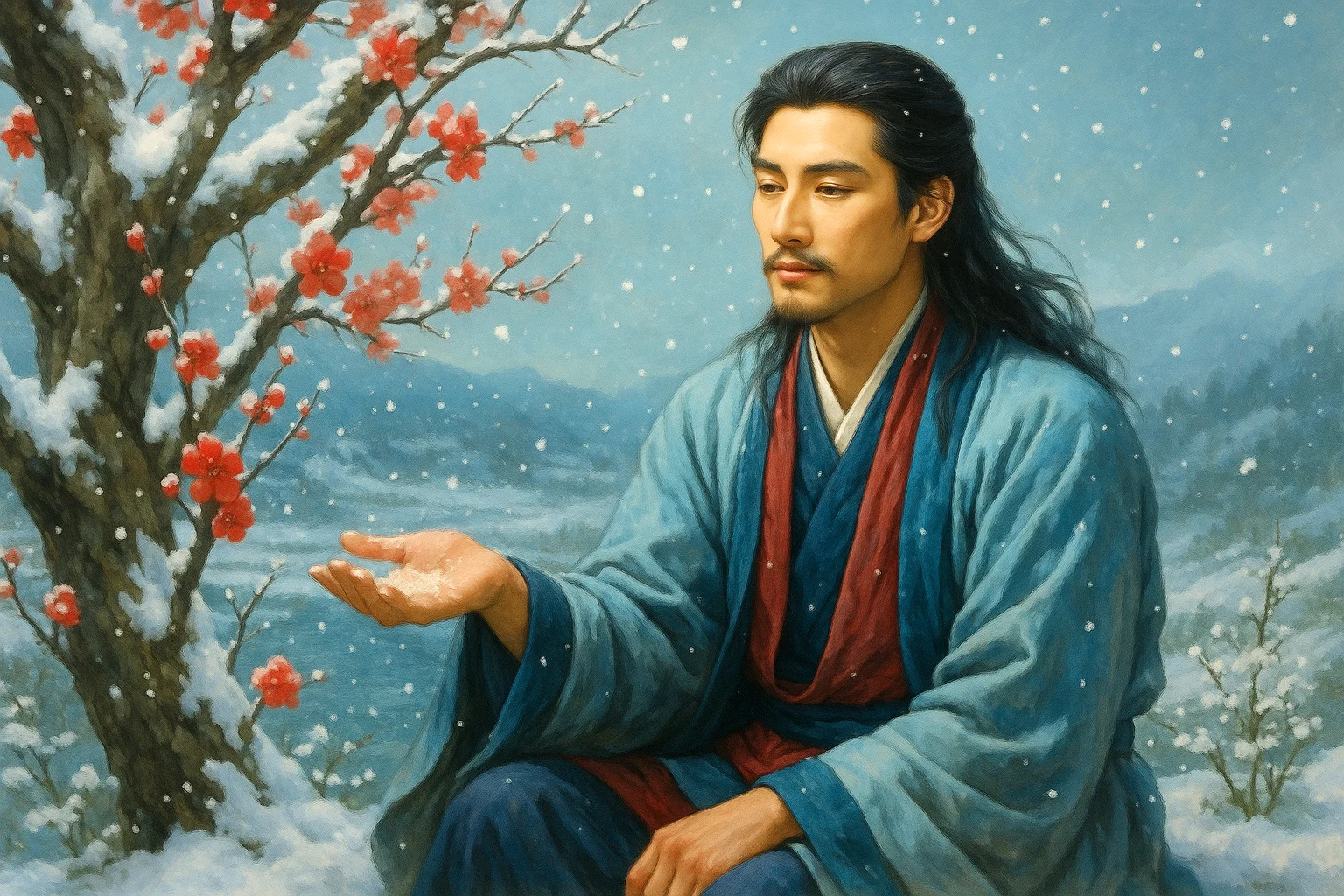A peerless belle from the capital,
Why drift like willow down to this creek shore?
Silken slippers peep from her raven socks—
A nymph from misty waves, nothing more.
Red lips may smile,
But dark brows ever frown.
With whom will she share this lonely spring?
Unused to sleeping without her mate,
She melts into a wisp of cloud
Above the western tower at evening.
Original Poem
「鹧鸪天 · 己酉之秋苕溪记所见」
姜夔
京洛风流绝代人。因何风絮落溪津。
笼鞋浅出鸦头袜,知是凌波缥缈身。
红乍笑,绿长嚬。与谁同度可怜春。
鸳鸯独宿何曾惯,化作西楼一缕云。
Interpretation
Composed in the autumn of 1183 during Emperor Xiaozong's reign, this ci poem was inspired by Jiang Kui's encounter with a courtesan by Tiaoxi Creek (modern Huzhou, Zhejiang). Struck by her tragic fate and wandering existence, the poet poured out profound empathy—a sentiment deepened by his own frustrations as a perpetual examination candidate and lifelong commoner, as well as by memories of a poignant past romance. More than mere observation, the work channels personal sorrow into a universal meditation on beauty and transience.
First Stanza: "京洛风流绝代人。因何风絮落溪津。笼鞋浅出鸦头袜,知是凌波缥缈身。"
Jīng luò fēngliú juédài rén. Yīn hé fēng xù luò xī jīn. Lóng xié qiǎn chū yā tóu wà, zhī shì líng bō piāo miǎo shēn.
A peerless flower of the capital's grace—
How came you here like willow down to this forsaken place?
Peeping from cage-like shoes, her crow-tip socks reveal
A nymph who once trod waves, now earthbound yet unreal.
The opening contrasts former glory ("peerless flower") with current exile ("willow down"), framing destiny's cruelty. The delicate details—"cage-like shoes" (笼鞋) and "crow-tip socks" (鸦头袜)—paint a portrait of refined beauty in decline, while "nymph who trod waves" (凌波) elevates her to mythical sorrow, echoing Cao Zhi's Goddess of the Luo River.
Second Stanza: "红乍笑,绿长嚬。与谁同度可怜春。鸳鸯独宿何曾惯,化作西楼一缕云。"
Hóng zhà xiào, lǜ cháng pín. Yǔ shuí tóng dù kělián chūn. Yuān yāng dú sù hé céng guàn, huà zuò xī lóu yī lǚ yún.
Red lips flash smiles as brief as bloom,
Green brows stay knotted with gloom.
Who shares this lovely spring with you?
Mandarin ducks scorn solitary nights—
Now you're but a wisp of cloud in western tower's view.
The stanza masterfully contrasts ephemeral joy ("red lips flash") with enduring sorrow ("green brows stay knotted"). The final transformation—from "mandarin ducks" (鸳鸯), symbols of conjugal bliss, to "wisp of cloud" (一缕云)—invokes both the Song Yu romance myth and Buddhist impermanence. This ethereal closure dissolves earthly suffering into the infinite, leaving only lingering resonance.
Holistic Appreciation
This lyric poem unfolds like an elegantly understated ink-wash painting, gradually revealing layers of emotion—from the woman's attire and demeanor to the profound loneliness and sorrow in her heart—each brushstroke delicate yet deeply moving. Though Jiang Kui composed this work in his later years, his sensitivity to life's fragility and sorrow remains acute, conveyed here with remarkable restraint. The silent woman in the poem, though wordless, feels palpably present. Through his empathy for this stranger, the poet expresses his own resonance and compassion. Perhaps this is no chance encounter, but a mirror of fate—her solitude reflecting his own.
Artistic Merits
- Scenes as Emotional Vessels, Characters as Emotional Anchors: The poet "records what he saw," yet the poem transcends mere description of the woman's appearance, becoming a meditation on life's unpredictability, with each layer of imagery deepening the emotional weight.
- Interplay of Tangible and Ethereal, Lingering Resonance: Concrete details like "red lips briefly smiling, green brows ever frowning" ("红乍笑,绿长嚬") give way to the transcendent image of her "dissolving into a wisp of cloud above the west tower" ("化作西楼一缕云"), leaving emotion to hover like mist, infinitely evocative.
- Allusions Woven with Ethereal Grace: References to The Goddess of the Luo River and the myth of Wu Mountain's clouds and rain enrich the poem's texture without ostentation, blending literary elegance with spiritual depth.
- Cool Precision Conveys Hidden Passion, Sorrow Without Sentimentality: Jiang Kui's signature "ethereal clarity" (清空) shines here. Though the emotion runs deep, his restrained tone avoids melodrama, letting the melancholy linger like orchid fragrance—subtle yet unforgettable.
Insights
This poem transcends the fate of one woman, reflecting instead the helpless "drifting willow catkins" of human existence. Against life's impermanence, even fleeting empathy becomes precious. With his tender yet cool brushstrokes, Jiang Kui preserves not just the silhouette of a silent woman but also an enduring compassion for the vulnerable. His approach—where sorrow speaks through restraint, and beauty lies in understatement—reminds us that depth of feeling can resonate most powerfully when expressed with economy and grace.
About the poet

Jiang Kui (姜夔, c. 1155 - 1221), a native of Poyang, Jiangxi, was a Southern Song Dynasty lyric poet and musician. He remained a commoner throughout his life. His lyrics are known for their ethereal and austere style, and his poetry is also highly regarded. Along with Fan Chengda and Yang Wanli, he is celebrated as one of the "Four Great Masters of the Restoration."












